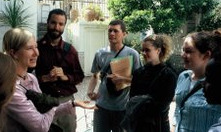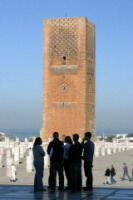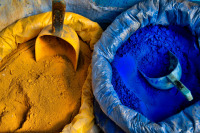Morocco is such an appealing travel destination due to its cultural, ethnic, and geographical richness on one side and its safety, good infrastructure and openness towards the West on the other side. Throughout history, the Strait of Gibraltar has been the gateway for Europeans into Africa.
Widening horizons - Building bridges between cultures
Non-profit organization for cross-cultural education
Program
Why Morocco
Elements of a Morocco Exchange program


- To experience the intersection of Islamic, African, Indigenous and Western cultures within a safe and open framework.
- To get to know Moroccan students from Rabat University, to engage in personal conversations, and share a walk through the medina.
- To experience traditional Moroccan food and personal connections in a family home stay.
- To meet Peace Corps volunteers and Fulbright scholars, discovering living in Morocco through their stories.
- To experience the unique, vibrant street life of historic medinas in Rabat, Asilah and Chefchaouen.
- To enjoy the rich variety of Moroccan landscape and connect with nature.
- To share insights that arise from broadened intercultural perspectives with travel peers.
Cultural Adjustment


It is easy to come off as a rich, arrogant foreigner in Morocco if participants are not conscious of their attitude in the country. Our pre-departure material informs participants about issues such as moderate clothing that is respectful to the host culture.
Throughout the program our program leaders give cross-cultural orientations on issues such as the family homestay or how to be respectful while taking pictures of people or special places. For many Moroccans the standards of living may be very different than what participants are used to, so displays of wealth such as jewelry and technological gadgets are discouraged throughout the program.
Participants are encouraged, supported and expected to make a genuine effort to learn more about the people and culture of the host community.
Safety

- Morocco Exchange would not organize student programs to Morocco if we did not feel it was safe. Since 2004, Morocco Exchange has run over 700 programs for more than 11,000 students.
- Morocco is a well established and safe travel destination. A large sector of the economy is based on tourism, in 2013, for example, over 10 million foreign tourists visited Morocco (http://data.worldbank.org).
- Peace Corps or Fulbright would not be in Morocco if they did not consider it to be safe. Currently, there are over 200 Peace Corps volunteers in the country, meaning these individuals who are often in their mid twenties are living on their own in rural areas.
- Morocco Exchange regularly contacts embassies in Rabat to receive their travel advice (eg. US embassy, 10000 Rabat, 2 Ave de Marrakech, Tel.:762265).
- Participants have a reading list, group activities and presentations about the background of the country and what they need to be aware of.
- We organize travel as a group with private vehicles and experienced program leaders.
- Please be aware that the crime rates in the EU and the USA are several times higher than in Morocco (nationmaster.com).
Health


- There are no vaccinations required for the areas we visit in Morocco.
- Adequate medical care is available in Morocco’s largest cities, particularly in Rabat, Marrakech and Casablanca. Specialized care or treatment may not be available. Medical facilities are adequate for non-emergency matters, particularly in the urban areas. Most medical staff will have limited or no English skills and will need the support of one of our staff members.
- Hygiene: Morocco is a country of the developing world and travelers need to be prepared that the standards of aesthetics, service and hygiene in public places cannot be compared to those in the West.
Practicalities

- Our programs are designed for American and European students, professors and organizations.
- Useful travel information containing details on visas, health, accommodation, communication, an equipment list and a list of recommended books will be sent to students before the program.
- Students will receive our Morocco Folder while traveling on the program with fascinating articles about culture, history and people.
- Visa: US and EU citizens do not require visas to enter Morocco. There are no entry or departure fees, either. But participants should make sure that their current Spanish visa status is such that return to Spain will not be a problem. Students travelling on a passport from any other country should contact the Moroccan Embassy in Madrid at +34 91 563 10 90 to seek information regarding possible visa requirements for entry to Morocco.
Prices

Please see our dedicated page for Program prices
